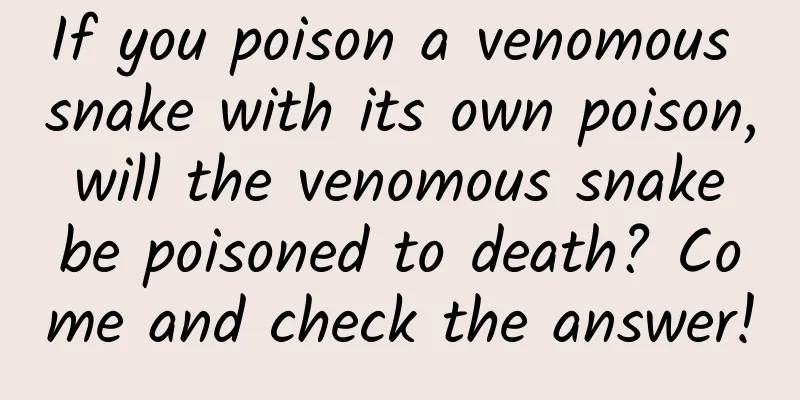If you poison a venomous snake with its own poison, will the venomous snake be poisoned to death? Come and check the answer!

|
Expert of this article: Lin Zhideng, PhD in Zoology, East China Normal University When it comes to snakes, many people are afraid of them, especially poisonous snakes. We all know that once bitten by a poisonous snake, you will be poisoned or even life-threatening. Many people are also curious about poisonous snakes. Since poisonous snakes are so poisonous, will they be poisoned to death by their venom? Well, since everyone asked sincerely, I will tell you generously (not boring at all)↓↓~ What will happen if a venomous snake bites you? ~ Normally, if you are bitten by a venomous snake, you will not experience any symptoms of poisoning. The toxin of venomous snakes is contained in a straw-like gap in the fangs, which is effectively controlled by muscles. The production of toxins is very time-consuming and energy-consuming, so venomous snakes will not release toxins easily, and will only activate this deadly weapon when they are in self-protection and hunting prey. Under normal circumstances, venomous snakes will not bite themselves. Even if they accidentally bite themselves during hunting, they generally will not release toxins, but will bite dry, so only skin injuries will occur. Copyright image, no permission to reprint In addition, in the process of natural evolution, most venomous snakes have also developed corresponding natural resistance factors. They exist in the serum of venomous snakes and are substances that can produce immunity to their own toxins. Therefore, even if a venomous snake bites you, due to the presence of venom antibodies in your body, the toxins cannot effectively play a role, and naturally you will not experience symptoms of poisoning. Of course, there are some special cases. When the toxins that enter the bloodstream when bitten by a venomous snake are too high and the antibodies in the body are not enough to resist the spread of these toxins, poisoning symptoms will occur. In addition, not all venomous snakes have evolved antibodies to protect themselves, such as the American fish-eating pit viper and the Egyptian cobra. Without the protection of antibodies, they will still be poisoned to death after being injected with their own venom. ~What if a venomous snake is bitten by another venomous snake? ~ Venomous snake toxins can be roughly divided into neurotoxins, blood circulation toxins and mixed toxins, but no matter what type of toxin, they need to enter the blood circulation to work. Whether a venomous snake will show symptoms of poisoning after being bitten by another venomous snake is mainly related to whether the venomous snake itself has antibodies and the dose of toxin injected. Venomous snakes generally have a certain immunity to venomous snakes of the same species, and some venomous snakes are even resistant to the toxins of different venomous snakes. When a venomous snake is bitten by another venomous snake, the toxin will quickly enter the blood circulation system. At this time, if the bitten venomous snake does not have antibodies to the toxin, the toxin will make the blood that comes into contact with it toxic, and will quickly cause the blood to coagulate and cause poisoning symptoms. Copyright image, no permission to reprint Even for venomous snakes that have their own antibodies, they will still experience symptoms of poisoning if the dose of toxin injected from the outside is too large. For example, a smaller venomous snake has a limited amount of antibodies in its blood. When bitten by a larger venomous snake, it will die because it cannot completely contain the spread of toxins. When the dose of toxin injected is small, it can be well suppressed by the antibodies it has, and no symptoms of poisoning will occur. ~Which snake has the most venomous venom? ~ As mentioned above, venomous snake toxins can be roughly divided into neurotoxins, blood circulation toxins and mixed toxins. Regarding how to evaluate the toxicity of these snake venoms, scholars generally consider the onset time, pain intensity, bleeding volume, average death time, mortality rate, lethal dose and other aspects. Blood-circulating toxins are widely found in the venom of venomous snakes of the Viper and Elaphe families. Common domestic snakes such as the Pit Viper, Agkistrodon acutus, Agkistrodon acutus, and Agkistrodon acutus secrete this type of toxins. There are many types of blood-circulating toxins with complex components, mainly including hemorrhagic toxins, coagulative toxins, and cardiac toxins. The characteristics of this type of venom are short onset time, strong pain, and high bleeding, but the venom is not highly toxic. Neurotoxins are mainly found in the genus Krait of the family Elapidae, such as the Bungarus bungarus and the Bungarus striata, and also in snakes such as the inland taipan and the Bell's sea snake mentioned above. The onset of the poison is slow, the amount of bleeding is small, and the initial pain is not obvious, but it is very dangerous after a full onset. The bitten person may experience whole body muscle tremors, foaming at the mouth, difficulty swallowing, difficulty breathing, and finally lying on the ground. The mortality rate is very high without serum. Mixed toxins, as the name implies, contain the characteristics of the above two toxins. Both cobras and king cobras of the family Elapidae secrete this venom. The bitten person will experience different symptoms at the same time, that is, when the toxin attacks, the nerves are damaged, and the blood circulation toxins cause harm at the same time. This type of venom is not very toxic, but the snakes that secrete this toxin, such as the king cobra, inject a huge amount of venom, which makes the venom work quickly and the reaction is violent. Currently, the most toxic snake venoms recognized are the neurotoxins secreted by the inland taipan, the most toxic terrestrial snake, and the Belcher's sea snake, the most toxic marine snake. Copyright image, no permission to reprint Taking the inland taipan as an example, the toxicology report shows that the median lethal dose (LD50) of its venom is 0.0021mg/kg, which means that only 0.0021mg of venom is needed to kill an animal per kilogram of body weight. Each time it excretes 125mg to 400mg of venom, it is enough to kill 250,000 mice or 100 adults. It is 300 times more toxic than a rattlesnake and about 20 times more toxic than a king cobra. ~What should I do if I get bitten by a snake in the wild? ~ If you are bitten by a snake outdoors, try to stay calm. When you are nervous and excited, your heart rate will increase, and your blood circulation will also increase. If you are bitten by a venomous snake, the toxin will spread faster and be absorbed more quickly. Then, quickly determine whether you have been bitten by a venomous snake based on the shape of the snake venom and the marks on the bite site. Generally, two rows of shallow, serrated tooth marks can be seen at the bite site of a non-venomous snake, while two larger fang marks will be left at the bite site of a venomous snake. Copyright image, no permission to reprint In addition, you can use gauze, clothes, ropes or rattan to tie the wound above the wound (proximal end) more than one joint. For example, if the wound is at the ankle, you can choose to tie the calf. It is not advisable to bandage too tightly. The tightness should be enough to insert a finger. It should allow arterial blood to pass through and venous blood to not flow back. Loosen the binding for about 1-2 minutes every 15-20 minutes. If there is a poisonous tooth on the wound, use pliers, a knife or other sharp objects to remove it. If conditions permit, use fire to disinfect it before use. After the foreign object is removed, use spring water, clean water, or carry mineral water and salt water to clean the wound. Do not use alcoholic beverages to prevent the toxin from spreading faster. Of course, the most important thing is to call your doctor before doing any of the above - so as not to miss the best time for treatment. The cover and watermarked pictures of this article are from the copyright gallery. The pictures are not authorized for reprinting. |
>>: One month on station! What has the crew of the "Dragon Horse Spirit" been busy with?
Recommend
Advertising effect is not good? This is 80% of the reason!
I often hear advertisers complain that SEM promot...
The electric vehicle fast charging market is heating up, and high-power fast charging is becoming a trend
As the electric vehicle market continues to heat ...
Ten key words for entrepreneurship in 2015
[[161410]] In 2015, China's entrepreneurial s...
Why can English become the only scientific language? |
In the 19th century, there were many languages ...
Is it expensive to produce a Guilin tourist supplies mini program? Guilin Tourism Products Mini Program Production Cost and Process
Mini programs provide convenience for publicity a...
Why do you always feel that you are not good-looking?
This article was reviewed by Zhao Wei, MD, associ...
Jules Verne's novel predicted air warfare half a century in advance
Editor's Note Military science fiction has a ...
Develop Android apps elegantly with Kotlin
Preface In the previous article, we briefly learn...
After the product is launched, the first thing you think of is to spend money on advertising?
When many novice website operators get a website ...
iOS 8.4.1 beta 2 update: mainly fixes bugs and improves performance
Apple today released the second beta of iOS 8.4.1...
Build a product retention analysis system from 0 to 1
In the capital winter, everyone is talking about ...
Event Operation: How to conduct an event aimed at attracting new customers?
At the beginning of this article, it is necessary...
6 analysis methods to teach you how to quickly diagnose SEM account performance
Only data can tell whether your promotion account...
The science behind mutual attraction
Usually, when we fall in love with someone, it se...
How much does it cost to be an agent for a makeup app in Cangzhou?
Why should you be an agent for WeChat Mini Progra...









